People’s History Museum is about creating a fairer world for everyone and we represent those working to achieve this.
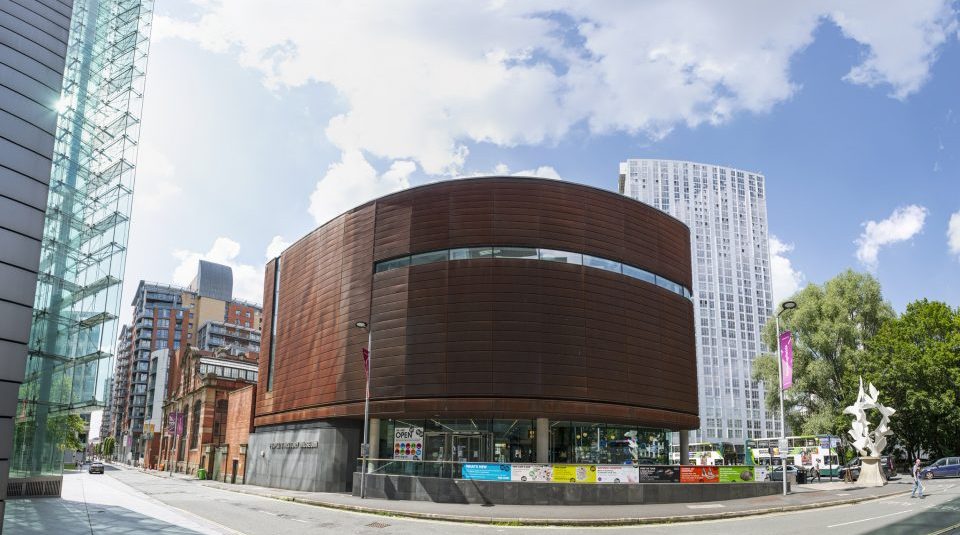
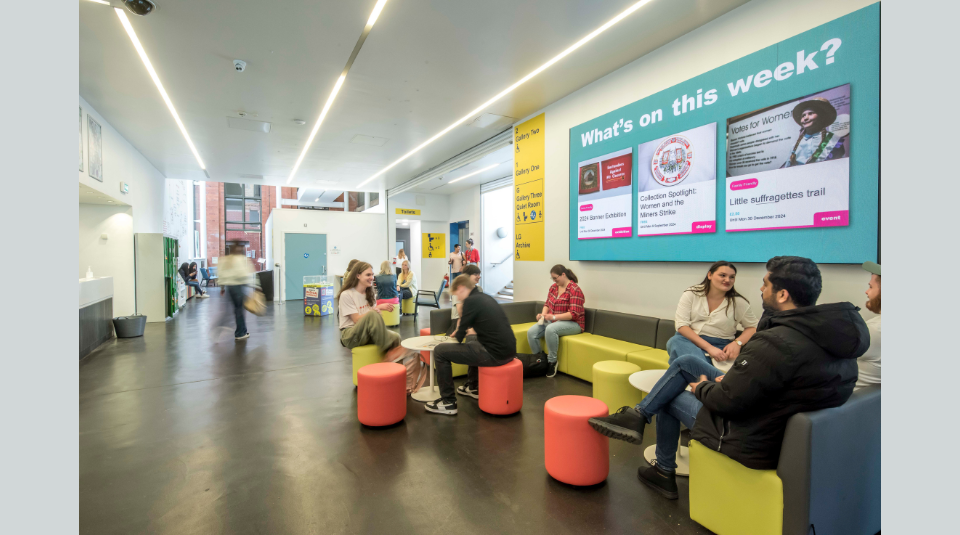
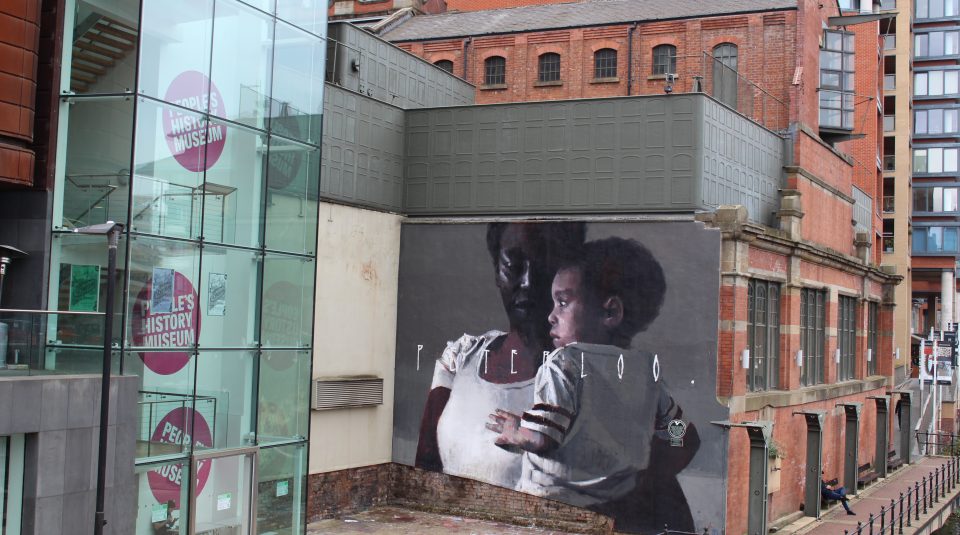
People’s History Museum (PHM) is the national museum of democracy, telling the story of its development in Britain: past, present, and future. Explore the radical stories of people coming together to champion ideas worth fighting for, and be empowered by the past to make a change for the future. We are all together in the fight for a fairer world.
People’s History Museum is about creating a fairer world for everyone and we represent those working to achieve this.
The museum is a welcoming organisation, committed to standing in solidarity with people who face persecution and discrimination. Examples of this include but are not limited to dismantling racism, championing trans inclusion, standing with sanctuary seekers, and embedding the social model of disability.
The collection and stories are curated to show a wide range of authentic narratives. Content is bold, brave, and challenging, but shared with care, compassion and hope for a better future.
We invite you to join us in…
We hope your visit energises you to harness your power to make change.

The role of the Board of Trustees is to offer guidance and expertise, working alongside the staff team to successfully implement PHM’s current Business Plan.
Find out more
The museum’s work has been recognised and celebrated through a range of award wins, shortlists, and nominations.
Find out morePHM is a charity and a company limited by guarantee with a maximum of 20 trustees. It is an independent museum and has no political affiliation.
PHM is Accredited by Arts Council England, and has been awarded Designated status, recognising the museum as having collections of national importance.
As a charitable organisation, the museum is very grateful to all its funders, helping us continue to tell the story of ideas worth fighting for.
Registered charity number: 295260. Registered in England as the National Museum of Labour History, number: 2041438.
Find out moreBrowse the latest press releases, helping to increase access to the museum’s collections and stories, along with expert insights from our specialist team.
For press, filming, and photography enquiries please contact Fido PR: clare.short@fidopr.co.uk.
Find out more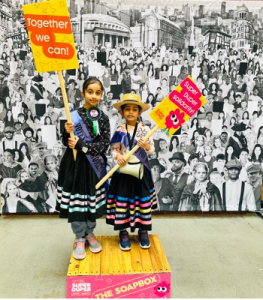 February 2026
February 2026
PHM hosted The Soapbox playzone as part of the Super Duper Family Festival organised by CityCo, which transformed Manchester into a giant playground during February half term holidays. Dressing up as protest heroes, finding their voices on the soapbox, and taking part in My First Protest Song, were just some of the free activities taking place at the museum.
1 October 2025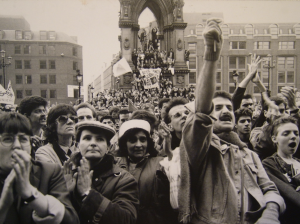
PHM announces its headline exhibitions for 2026. Re/Assemble, which draws inspiration from the 1988 Section 28 protest marches in Manchester (from 17 January 2026), and On The Line, which marks the centenary of the General Strike of 1926 and examines its legacy (from 21 March 2026).
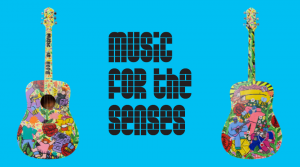
7 July 2025
A summer of music takes over Manchester and at PHM the Music for the Senses guitar by artist Ella Masters goes on display as part of an art trail across the city, to be followed by the Music for the Senses Guitar Exhibition & Art Fair in September. The exhibition at PHM includes all 48 of the trail’s decorated guitars, along with those donated by Oasis, Elbow, Doves, New Order and more. The project is a collaboration between Wild in Art and Manchester City Council.
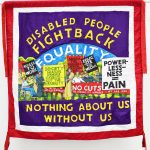 7 June 2025
7 June 2025
Design and Disability opens at The Porter Gallery, V&A South Kensington. An exhibition showcasing the radical contributions of Disabled, Deaf, and neurodivergent people and communities to design history and contemporary culture, from the 1940s to now. It includes Ed Hall’s iconic banner, on loan from PHM’s world renowned collection.
3 – 4 May 2025
May Day Makers Markets take place for the first time, with future makers markets to follow. Designed to showcase talented local makers to museum visitors, they are also an important source of support to the museum.
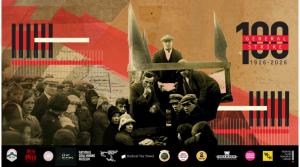 2 April 2025
2 April 2025
PHM is named as one of the partner organizations of the #GeneralStrike 100 anniversary national partnership with the General Federation of Trade Unions (GFTU) and a group of museums, libraries and archives to co-ordinate the general strike centenary celebrations.
31 March 2025
PHM’s team took a special visit to 10 Downing Street so that the Gay Labour Group banner could take part in an event to mark 50 years since the founding of what is now known as the LGBT+ Labour Group.
13 March 2025
PHM celebrates the relaunch of its venue hire offer – a vital source of revenue for the museum – with an evening held for guests to explore the heritage spaces and contemporary new Riverside Room. This work has been made possible by an Adapt to Thrive Grant awarded by the National Lottery Heritage Fund in January 2024.
22 February 2025
Resistance opens at Turner in Margate. Curated by artist and filmmaker Steve McQueen, it tells forgotten stories of how ordinary people fought for change between 1903 and 2003. Two images are featured from PHM’s collection. These capture the hunger marches of the 1930s and the Battle of Cable Street in 1936.
 17 October 2024
17 October 2024
Clare Barlow is announced as new Director for PHM, following in the footsteps of Katy Ashton who held the position for 14 years. Clare’s experience includes roles at Foundling Museum, Science Museum, Wellcome Trust, Tate and the National Portrait Gallery. She takes up the role from 1 January 2025.
18 September 2024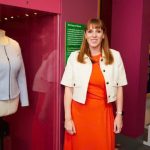
Angela Rayner, Deputy Prime Minister of the Labour Party, visits the museum ahead of the Labour Party’s first conference in government, where the jacket that she wore on her first appearance at Prime Minister’s Questions (PMQs) is on display.
September 2024
PHM is named as one of the partner organisations in Inclusive Histories, a project led by Royal Holloway, University of London and supported by the Arts and Humanities Research Council, with the aim of encouraging a more inclusive teaching of UK political history for KS4 students.
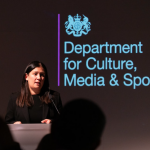 31 July 2024
31 July 2024
In her first speech as Culture Secretary, under the new Labour government, Lisa Nandy MP names People’s History Museum as her favourite museum, recognising its role in sharing “the history of ordinary people and the ideas that drove them” and how this can “not just help us not just to interpret the past, but can help us navigate the future”.
19 July 2024
Injecting Hope: The race for a COVID-19 vaccine exhibition opens at the Science and Industry Museum featuring on loan from PHM Andy Burnham’s dark navy worker’s jacket. The jacket was worn in October 2020 when the Mayor of Greater Manchester spoke out about the Greater Manchester region facing the harshest Covid-19 lockdown restrictions without a support package for businesses and low-paid workers.
 July 2024
July 2024
Playful Protest Space opens in Galley Three, where families can take part in activities inspired by the museum’s collections.
June 2024
The installation of a Change Places Toilet sees the completion of the Welcome Project at PHM to improve the museum’s accessibility for visitors.
March 2024
A project to digitalise PHM’s collection of miners’ strike objects is completed as the 40th anniversary of the Miners’ Strike of 1984 to 1985 is marked.
15 September 2023
Work on the Welcome Project at PHM starts, with the aim of making the museum an exemplar for accessibility and visitor experience. The first stage of work is the museum’s entry.
20 June 2023
The Manchester suffragette banner goes on display in PHM’s main galleries to mark its 115th birthday.
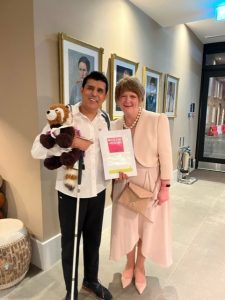 10 May 2023
10 May 2023
PHM is highly commended for Community Engagement Programme of the Year for Nothing About Us Without Us, a year long programme of activity including the headline exhibition of the same name (16 November 2022 – 16 October 2023) from the Museums + Heritage Awards.
March 2023
PHM welcomes the news that it will continue to receive funding from the Greater Manchester Culture Fund, joining 40 other organisations working to ensure that the city-region remains world famous for its cultural offer.
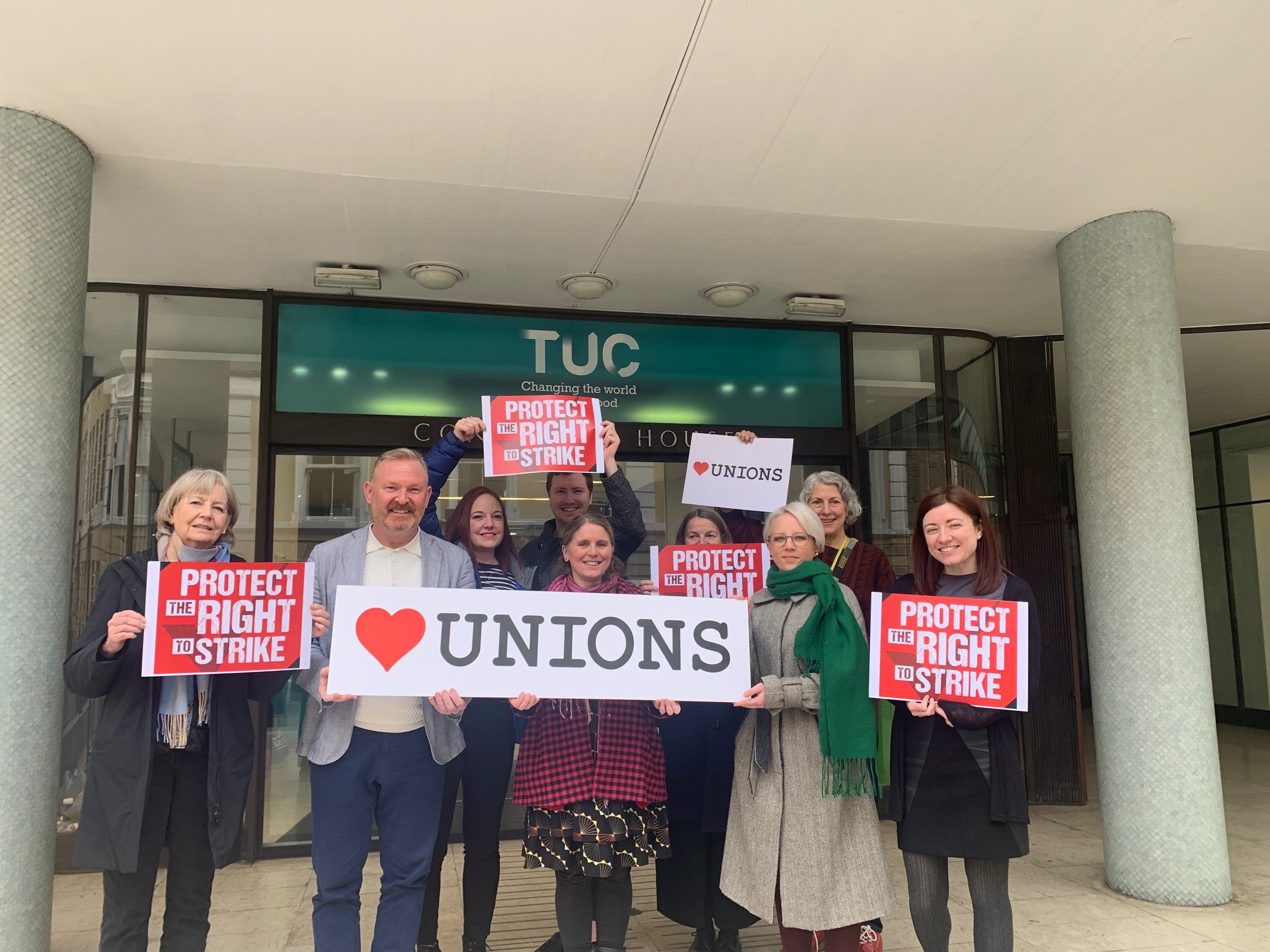 12 February 2023
12 February 2023
PHM Chair, Trustees and staff support HeartUnions week (13-19 February 2023) at TUC, Congress House, Great Russell Street, London.
30 January 2023
PHM joins human rights organisations who share a collective concern about the impact the Strikes (Minimum Service Levels) Bill could have on the right to strike. The Bill threatens a huge backward step for workers’ rights and freedoms that previous generations fought hard to secure and be recognised in law – the stories of which are told at PHM. Alongside 50 organisations PHM signed an open letter to the Business Secretary, urging the government to reconsider their proposals.

January 2023
PHM is awarded Museum of Sanctuary status in recognition of its inclusive and welcoming approach towards people seeking asylum and refugees.
16 November 2022
Nothing About Us Without Us opens – a landmark exhibition created in conjunction with a team of Community Curators to explore the history of disabled people’s activism and the ongoing fight for rights and inclusion.
3 November 2022
PHM is shortlisted for Best Museums Change Lives Project for Migration: a human story, from Museums Change Lives Awards. The awards recognise and celebrate outstanding practice by UK museums delivering social impact, promoting the best examples of work by museums and individuals that support communities and engage with contemporary issues.
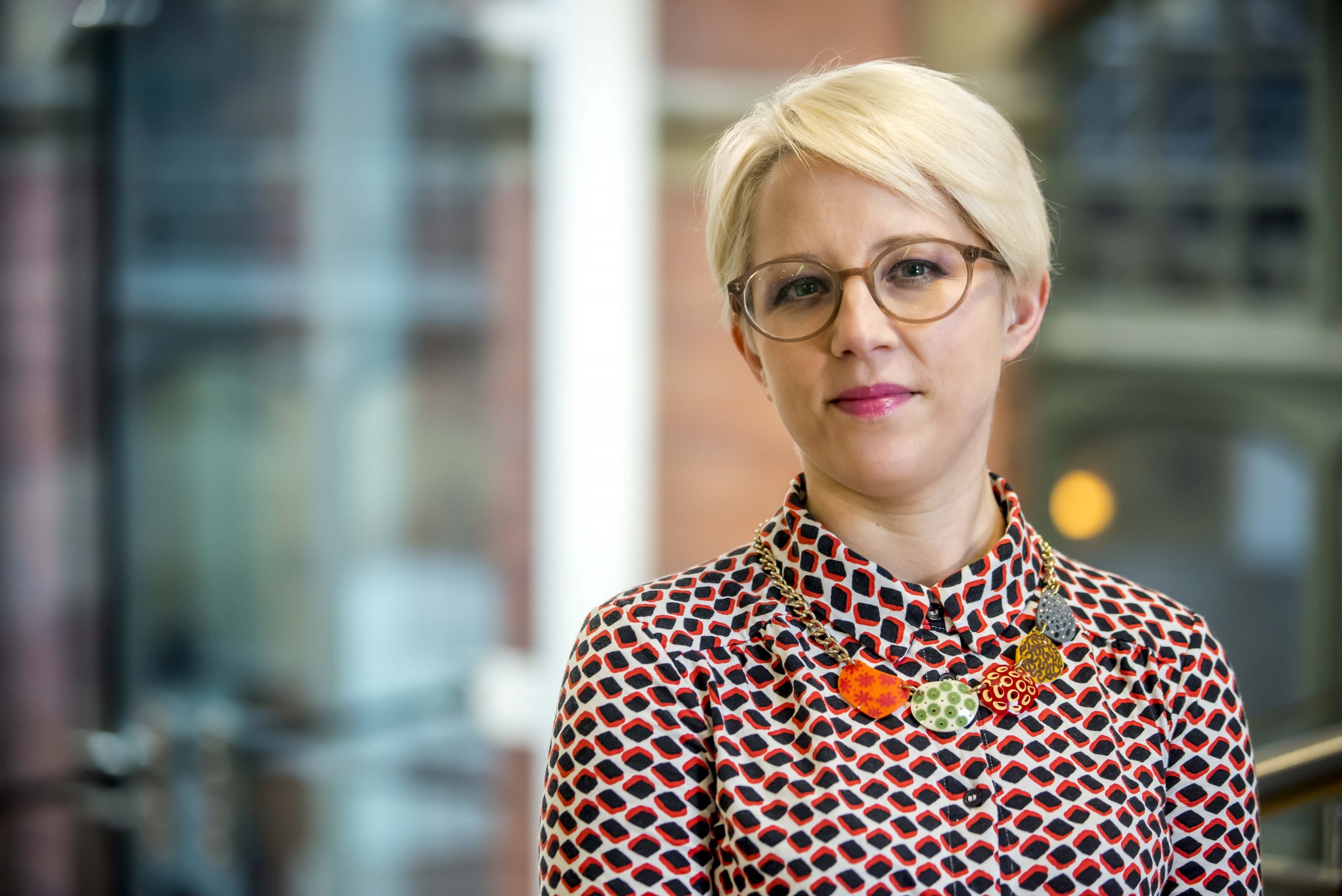 November 2022
November 2022
Becky Peters joins PHM as Director (interim) bringing a wealth of experience, including her work with Bristol Culture & Creative Industries.
23 September 2022
PHM joined organisations and schools across Manchester supporting the launch of the campaign by Together With Refugees to #FillTheSkiesWithHope – calling on the new Prime Minister, Liz Truss, to end the scheme that sends refugees to Rwanda. Hundreds of orange heart shaped planes filled the museum, carrying messages of hope, which were later delivered to the Prime Minister. Watch the #FillTheSkiesWithHope campaign video.
July 2022
A co-curated programme of activity exploring the history of disabled people’s rights and activism begins with the opening of Until It Looks Like This featuring the work of artists from one of Manchester’s leading visual arts organisations, Venture Arts.
June 2022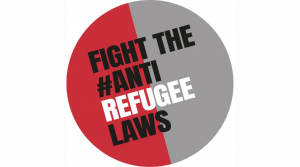
PHM signed the #AntiRefugeeLaws pledge, joining thousands of individuals and organisations to fight the anti refugee laws, as we believe that the UK should offer sanctuary to those who need it.
10 May 2022
PHM is announced as one of five museums across the country shortlisted for Art Fund Museum of the year 2022; the largest museum prize in the world, celebrating the UK’s museums and galleries, rewarding their resilience, creativity and imagination.
14 February 2022
PHM wears its heart on its sleeve to stand Together With Refugees and against the Nationality and Borders Bill. Today, on Valentine’s Day, the museum urges the government to rethink its approach, delivering postcards to the Home Secretary that visitors have been writing to show their reactions to the Bill.
December 2021
PHM wins an Activist Museum Award from the Research Centre for Museums and Galleries (RCMG), part of the University of Leicester’s School of Museum Studies. The awards celebrate and foster activist thinking and practice in the UK museum community.
18 October 2021
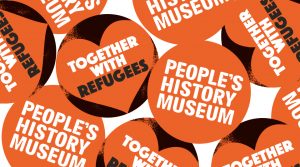 PHM begins a week of action standing Together With Refugees and against the Nationality and Borders Bill and the approach it will take on the right to seek asylum. PHM believes the UK should defend the basic right to claim asylum, however you arrive in the country, offering sanctuary to those who need it.
PHM begins a week of action standing Together With Refugees and against the Nationality and Borders Bill and the approach it will take on the right to seek asylum. PHM believes the UK should defend the basic right to claim asylum, however you arrive in the country, offering sanctuary to those who need it.
12 September 2021
PHM joins 350 organisations to oppose the Police, Crime, Courts and Sentencing Bill, fearing that it will silence marginalised voices fighting for change. Watch our statement video and read our blog with Amnesty International exploring 10 famous protests the Policing Bill would have threatened.
25 August 2021
The launch of Migration: a human story reveals the results of the Community Programme Team’s project to evaluate how stories of migration are told within the museum. Family friendly trails exploring experiences of migration are one element of a series of interventions throughout the building.
26 May 2021
PHM and Open Kitchen win Green Award for their partnership Open Kitchen Cafe & Bar at PHM, from the Cultural Enterprises Awards, celebrating creativity and resilience in the cultural sector.
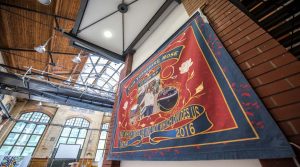 19 May 2021
19 May 2021
PHM reopens its doors following the end of Covid-19 restrictions with the launch of new exhibition exploring the life, values and legacy of Jo Cox MP, who was murdered in June 2016; More in Common: in memory of Jo Cox.
30 March 2021
PHM announces a partnership with Manchester’s leading conscious food company, Open Kitchen with a new cafe & bar opening on Wednesday 19 May when the museum is due to reopen.
25 March 2021
PHM is highly commended for Digital Campaign or Campaigner of the Year for Vital Voters, a project engaging young people with the power of democracy. Received from the Your UK Parliament Awards 2021, celebrating people across the UK who have taken action on the issues they care about.
15 December 2020
The ongoing closure of PHM and the pressures it has suffered in 2020 make the future of the museum uncertain. All its revenue streams have been frozen with the closure and PHM was not eligible to apply to the government’s Culture Recovery Fund. Facing a critical situation, #SecureOurFuture Crowdfunder is launched.
5 November 2020
Manchester is again placed into Tier 3 of Covid-19 restrictions, but this time cultural organisations are not able to open. PHM closes its doors again.
1 September 2020
After being closed for over five months the national museum of democracy reopens its doors and warmly welcomes people back to PHM, with a continuation of the headline theme, exploring migration.
May 2020
Black Lives Matter protests take place globally following the death of George Floyd in the USA on 5 May 2020, including in Manchester. Images of the Manchester protests taken by photographer Jake Hardy are acquisitioned into PHM’s collection as part of its Contemporary Collecting.
April 2020
PHM increases the level of activity being delivered by its ongoing programme of Contemporary Collecting to reflect the unprecedented events of 2020, including within this an emphasis on Covid-19.
19 March 2020
A national lockdown is announced as a result of the global Covid-19 pandemic. All workplaces, schools, universities, shops, bars, restaurants and cultural organisations close their doors, with only key workers continuing to go in to work. PHM closes its doors and the team, all working remotely, start to develop a programme of online activity that will lead to the launch of Ideas Worth Exploring.
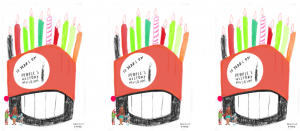 13 February 2020
13 February 2020
PHM marks the 10th anniversary of its current building with a party, a live music event and open house celebration. Salena Godden’s poem Pessimism is for Lightweights is unveiled as a new permanent feature. The museum’s Impact Report is published on the story and results of PHM’s work over the last ten years.
1 January 2020
PHM begins its most ambitious programme to date, with a year dedicated to the exploration of migration, working with a specially recruited Community Programme Team made up of people whose lives have been shaped by migration. The focus for contemporary collecting is on migration and the effect of the hostile environment.
Consultation begins for a programme exploring disabled people’s rights and activism.
2020
PHM wins Toymark Good Practice Award, for the PHM shop from Let Toys Be Toys, recognising retailers that are doing a great job of offering toys to girls and boys alike.
8 November 2019
The Board elect interim Co-Chairs, Martin Carr, Founding Partner of For The Boardroom and Lord Bassam of Brighton, a British Labour and Co-operative politician and a member of the House of Lords.
20 September 2019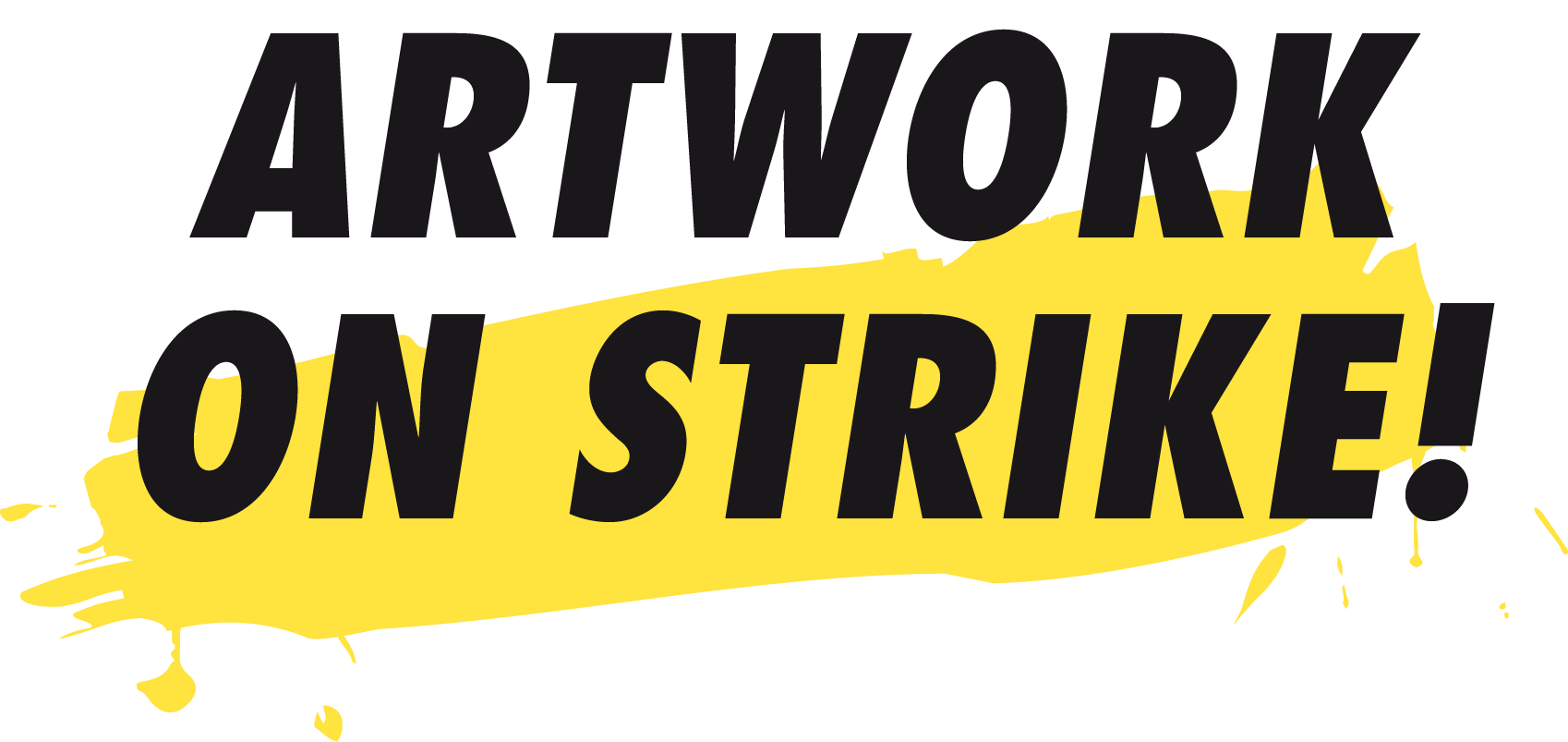
PHM joins the Global Climate Strike by carrying out an #ArtStrike. Exhibits in Disrupt? Peterloo and Protest go on strike for the day in support of those demanding action to prevent further global warming and climate change. The #ArtStrike initiative is led by the UK Student Climate Network.
September 2019
Student climate strike placards are added to the museum’s collection.
16 August 2019
PHM plays a leading role in marking the 200th anniversary of the Peterloo Massacre. In this month alone 11,000 people visit the exhibition Disrupt? Peterloo and Protest, which is part of a year long focus for the whole museum exploring the past, present and future of protest. It includes a very rare Peterloo artefact donated by a descendant of its owner who was present at Peterloo, known as the Peterloo cane.
24 June 2019
PHM wins Best Cultural Venue from The Manchester Awards, celebrating everything that is great about the city, rewarding those individuals, businesses and organisations that have proved themselves to be indispensable to the city’s success.
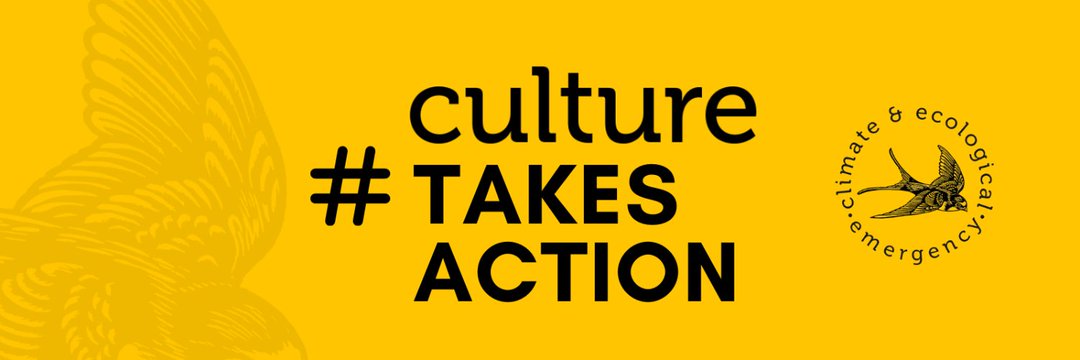 14 June 2019
14 June 2019
PHM joined the Culture Declares Emergency campaign, committing to embedding sustainable practices into the museum’s day to day operations, engaging audiences to inspire action, whilst also working towards becoming a zero carbon museum by 2038.
2019
PHM wins Toymark Good Practice Award, for the PHM shop from Let Toys Be Toys, recognising retailers that are doing a great job of offering toys to girls and boys alike.
27 November 2018
PHM is commended by the judges for Best Contribution to a Heritage Project by Young People, for their project exploring ideas of representation with Falinge Park High School. Received from Historic England Angel Awards, celebrating the efforts of people taking action to champion their local heritage.
15 November 2018
PHM wins Best Exhibition Award for Never Going Underground: The Fight for LGBT+ Rights (25 February – 3 September 2017) and a Special Commendation for Best Performance with Contact Young Company for She Bangs The Drums. Received by the Manchester Culture Awards celebrating people, groups and organisations who made culture buzz in Manchester during April 2017 to March 2018.
November 2018
The museum discovers and displays the first written account of suffragette force-feeding in prison in a 1909 letter written from one suffragette to another.
October 2018
A mural on the exterior of the building by international street artist Axel Void is revealed called Peterloo. The work remembers the Peterloo Massacre by viewing it through the lens of the Windrush scandal.
2 July 2018
PHM wins National Collaboration of the Year Award, for exhibitions Represent! Voices 100 Years On (2 June 2018 – 3 February 2019) and Never Going Underground: The Fight for LGBT+ Rights (25 February – 3 September 2017), from the National Democracy Week Awards he National Democracy Awards, highlighting the work of national leaders in democratic engagement.
27 June 2018
PHM wins Heritage, Museum, Library and Education Partnership Award, in partnership with Manchester Secondary Pupil Referral Unit, for the artist-led project Who Represents Me; a bold, colourful and powerful piece of artwork featuring as part of the exhibition Represent! Voices 100 Years On(2 June 2018 – 3 February 2019). Received from the North West Cultural Education Awards, shining a light on those individuals, schools and organisations that have gone above and beyond in their work to bring the benefits of great arts and culture to the region’s children and young people – celebrating and championing best practice and innovation in the sector.
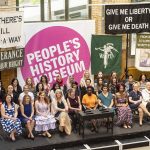 2 June 2018
2 June 2018
Represent! Voices 100 Years On exhibition opens by recreating a suffragette protest that took place in 1910 ahead of a march which would become known as Black Friday due to the atrocities that were inflicted upon those seeking to gain the right to vote.
Leading the voices of today is women’s rights activist and writer Helen Pankhurst, great granddaughter of Emmeline Pankhurst.
The museum acquires Women’s March placards and a pink ‘Pussyhat’ to reflect contemporary campaigns for women’s rights.
6 February 2018
As the centenary of the Representation of the People Act (1918) is marked, PHM begins a year long programme to consider what representation means to people one hundred years on.
2018
PHM wins Toymark Good Practice Award, for the PHM shop from Let Toys Be Toys, recognising retailers that are doing a great job of offering toys to girls and boys alike.
21 October 2017
PHM wins Volunteers in Museum Learning Award, for the Community Curators of Never Going Underground: The Fight for LGBT+ Rights, a year long programme of activity including the headline exhibition of the same name (25 February – 3 September 2017) from Marsh Christian Trust Awards, recognising the best and most innovative ways in which volunteers work within local and national museums and galleries to engage the public with collections and exhibitions.
2 October 2017
PHM is named as the Family Friendly Museum of the Year. Presented by national organisation Kids in Museums, this is the only museum award in Britain where families pick the winner.
August 2017
With the support of a crowdfunding campaign, the museum acquires the Manchester suffragette banner (1908), which becomes one of the most iconic pieces in its collection.
17 May 2017
PHM wins Volunteer Team of the Year for the Community Curators of Never Going Underground: The Fight for LGBT+ Rights, a year long programme of activity including the headline exhibition of the same name (25 February – 3 September 2017) from Museums + Heritage Awards for Excellence.
 2 March 2017
2 March 2017
Actor and activist Ian McKellen opens the exhibition Never Going Underground: The Fight for LGBT+ Rights.
This marks 50 years since the partial decriminalisation of homosexual acts in England and Wales (1967 Sexual Offences Act) and is the first time that the museum takes a theme-led approach to its programming. Throughout 2017 events, talks, community projects and learning sessions explore the LGBT+ movement and the museum continues to grow its collection to better represent LGBT+ stories.
2017
PHM embarks on an ambitious contemporary collecting programme, linking to programme themes; LGBT+ stories, contemporary campaigns for women’s rights, modern protest, migration and disabled people’s rights and activism.
18 May 2016
PHM unveils an interactive installation The Euro Tunnel ahead of the EU Referendum in June, explaining what the EU does, who our MEPs are, how they are elected and encouraging people to use their vote.
18 May 2016
PHM is highly commended for Fundraisers of the Year for Sponsor a Radical Hero campaign from Museums + Heritage Awards for Excellence.
28 January 2016
Baroness Jan Royall takes over from Lord John Monks as Chair of PHM’s Board of Trustees.
29 April 2015
PHM wins Guardian Culture Pros Pick from Museums + Heritage Awards for Excellence, an award for the UK’s most inspiring museum or heritage visitor attraction of the year, voted for by the public.
14 February 2015
Election! Britain Votes opens ahead of the 2015 general election, a major exhibition charting the history of general elections in Britain over the last 100 years. The interactive experience includes the opportunity to register to vote, live feeds, broadcasts and evolving statistics.
17 November 2014
Join the Radicals scheme is launched, enabling people to sponsor their chosen Radical and in doing so support vital work of the museum.
2013-2014
PHM welcomes a record breaking 100,000 visitors. Donations, Venue Hire bookings and shop sales soar.
1 November 2012
PHM’s first same sex civil partnership ceremony is held at the museum.
30 May 2011
PHM’s first wedding ceremony takes place with the reception held in the Engine Hall.
19 May 2011
PHM receives a Special Commendation from the European Museum of the Year Awards, recognising excellence in the European museum scene.
11 May 2011
PHM is highly commended for Best Marketing Campaign for the re-branding of the museum from Museums + Heritage Awards for Excellence.
4 March 2011
PHM wins a Civic Trust Award, recognising outstanding architecture, planning and design in the built environment.
12 November 2010
PHM wins Best Website Award in the not for profit/charity sector from the Drum Awards for the Digital Industries (DADIs) for best website in the not for profit/charity sector category.
14 October 2010
PHM wins Building of the Year Award from the Greater Manchester Chamber of Commerce, given in recognition of key construction projects in Greater Manchester.
 9 August 2010
9 August 2010
Katy Ashton joins as Director and leads the museum on the next chapter of its trail blazing journey.
13 February 2010
The new museum opens its doors to the public for the first time and features two permanent galleries, a state of the art conservation studio, a changing exhibition gallery, archive and study centre and extensive learning and community spaces where visitors are invited to explore ideas worth fighting for.
The first annual banner exhibition takes place. This has taken place every year since and results in the revamp of a quarter of the museum’s main galleries and its visitor experience.
The new museum is officially opened by Secretary of State for Health Andy Burnham MP.
27 October 2009
The Pump House celebrates its centenary. The building was built between 1907 and 1909, and was designed by City Architect Henry Price, who also designed Victoria Baths.
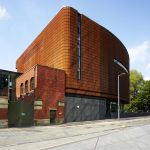
January 2009
The museum’s new extension is clad in Cor-Ten® steel, the first public building in Manchester to use this unusual material perhaps most well known for being used for the Angel of the North.
28 January 2008
PHM @ MOSI is opened by Secretary of State for Children, Schools and Families Ed Balls MP, with some of PHM’s most popular displays on show in the 1830 Warehouse.
16 January 2008
An investment of £12.5 million is successfully secured from local, regional and national partners. Work begins on a modern four storey extension attached to the Pump House.
7 October 2007
PHM closes to the public and work begins to move both staff and the collections to their short term homes. For the museum this means a temporary home at the Science and Industry Museum (MOSI).
27 April 2007
Songwriter and political activist Billy Bragg opens the last changing exhibition, Battle for the Ballot – the struggle for the vote in Britain, before the museum closes for redevelopment.
25 January 2006
Heritage Lottery Fund (HLF) agrees to support the museum’s proposed ‘one site’ project – to bring all of the museum’s activities, services, operations and staff onto one site.
9 August 2005
Chancellor of the Exchequer Gordon Brown MP announces PHM is to become one of the national museums that is free to enter.
2004
A Peterloo pike, which is said to have been used on St Peter’s Field by one of the protestors for self-protection, is donated to the museum by the owner’s great, great, great grandchild. This is one of several significant Peterloo Massacre items in PHM’s collection.
17 July 2003
A key item of 1980s political history, Michael Foot’s ‘donkey jacket’ is donated to the museum. The former Leader of the Labour Party was widely criticised for wearing it at the Cenotaph for the 1981 Remembrance Day service. The jacket was bought by Michael Foot’s wife from Harrods.
1 February 2002
The museum announces a new name: People’s History Museum (PHM) ahead of the XVII Commonwealth Games in Manchester (summer 2002). The museum’s changing exhibition programme becomes more diverse with a focus on cultural diversity and social inclusion became part of the Commonwealth Games’ legacy.
3 November 2001
Reforming Manchester: The Liberals and the City exhibition is opened by Leader of the Liberal Democrats Charles Kennedy MP.
2001
The museum becomes part of a Pan-European collaboration funded by the European Union (EU) – Migration, Work and Identity – with seven sister institutions. The project lasts for four years with exhibitions, publications and joint learnings exploring migrant communities throughout the continent.
ITV’s Spitting Image co-creator Roger Law donates the puppets of Harold Wilson and Michael Foot. The number of puppets in the collection has since grown and remains a fascination for visitors.
26 February 2000
The Builders and the Dreamers: One Hundred Years of the Labour Party exhibition is opened by Home Secretary Jack Straw MP.
26 September 1998
The Tories and the People: Mass Conservatism 1867-1997 exhibition is opened by Leader of the Conservative Party William Hague MP. It is the first of four exhibitions on British political parties, and draws on the museum’s extensive collection of Conservative Party objects from the original iteration as the Tories to today.
Spring 1998
Created with professional actors, writers and directors in conjunction with Peoplescape Theatre, a series of Living History performances is developed to tell the stories of historical moments through the lives of individuals. Events covered include the Match Girls’ Strike (1888) and the Jarrow March (1936). Regular performances were part of public programmes and bookable for groups as part of the Learning Programme.
1998
The Department of Culture, Media and Sport (DCMS) introduces a ‘Designation Scheme’, for collections of ‘pre-eminent national importance’. The museum’s complete collection is given Designated status.
1997
The Employment Department donates a unique collection relating to the impact of the state on working people.
The museum embarks on the National Banner Survey of all historic banners in UK museum collections. It is the very first attempt to create a national survey of one group of objects. Over 3,000 museums take part. The survey records are still hosted on the collections database and are searchable on the museum website.
1995
Following the disbandment of the Communist Party of Great Britain, the museum acquires the party’s collections of working class material. This includes several hundred early 19th century radical and anti-radical cartoons, posters from the Tory and Liberal parties and women’s suffrage movement posters.
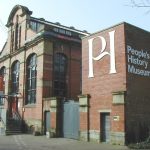 28 May 1994
28 May 1994
Larger premises are needed, so a second site is opened at Manchester’s Grade II listed Edwardian Pump House, which had been closed since 1972. The building allows for public galleries, exhibition spaces, learning programmes, events and a shop and cafe.
The expansion to a second site is accompanied by a vision to expand the museum further in the future, so that all its activities, services, operations and staff can be on one site.
1992
A commemorative plate is donated to the museum, a piece created to recognise the Dagenham Ford sewing machinists’ strike of 1968 and the Equal Pay Act that followed in 1970.
1991
The archive of campaign group Lesbians and Gays Support the Miners (LGSM) is donated to the museum.
1991
The museum is awarded national registration, under a recently introduced Museum Registration scheme.
May 1990
After challenging work to fund the move from London and catalogue the collection, The National Museum of Labour History opens in its new location on Princess Street in central Manchester, in the building where the first meeting of the Trades Union Congress (TUC) took place over one hundred years earlier.
A series of changing exhibitions begins, with partners including the Musicians’ Union and the Professional Footballers’ Association.
April 1990
The Labour Party archive arrives – the most complete political party archive in the world, which is later followed by Labour Party poster, photographic and object collections.
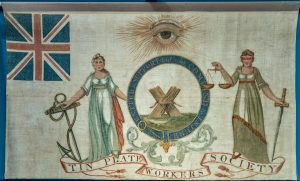 1990
1990
Interest in the museum and the work it is doing to engage people in the story of British democracy continues to grow and the collection rapidly expands. This includes the acquisition of important 19th century trade union banners.
The oldest surviving trade union banner, the Tin Plate Workers Society banner of 1821, is one of those acquired.
February 1989
Director Dr Nick Mansfield is appointed and builds up a team of qualified staff, and the existing collection begins to be properly catalogued and conserved.
1988
The museum’s future is threatened by a lack of funding, the collection is rescued by Manchester City Council and the Greater Manchester authorities, with the help of the Trades Union Congress (TUC). The move to Manchester begins.
July 1986
A Board of Trustees is created by Michael Foot MP and General Secretary of the Transport and General Workers’ Union (TGWU) Jack Jones.
1985
The museum acquires a vast part of influential artist Cliff Rowe’s (1904-1989) work including paintings, works on paper, sketchbooks and folios. Many of the images capture female scientists at work.
1980-1984
The museum rescues material that would simply have been lost otherwise. The museum also acquires the complete collection from prominent activist Walter Southgate (1890-1986). This sees the museum grow from one room in Limehouse Town Hall to the entire building.
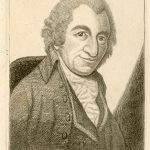 1975
1975
The National Museum of Labour History (NMLH) is opened by Prime Minister Harold Wilson in Limehouse Town Hall in Tower Hamlets, London. The collection on display to the public includes writer and political activist Thomas Paine’s (1737-1809) desk and banners that would go on to form what would become the largest collection of political and trade union banners in the world.
1960s
A group of activists, including the Trade Union Labour and Co-operative History Society (TULC), begin to collect historical campaign materials about the rights of working people.